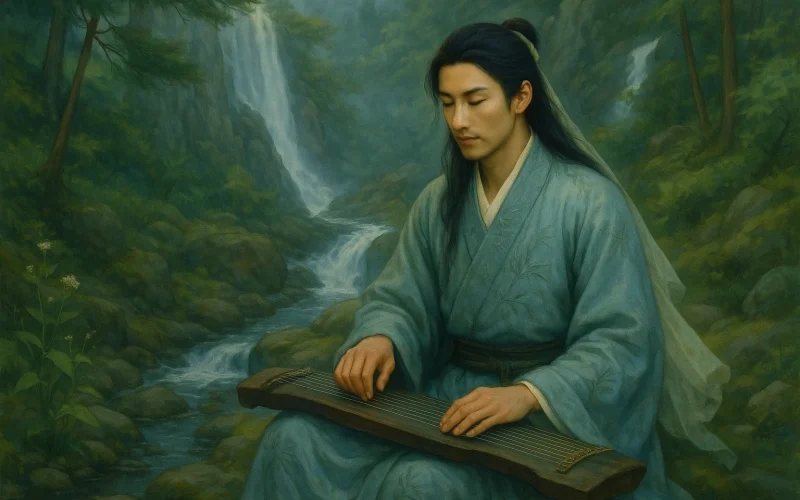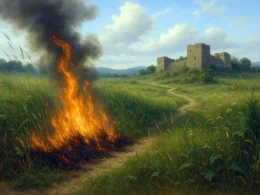Mountains cover the white sun,
And oceans drain the golden river;
But you widen your view three hundred miles
By going up one flight of stairs.
Original Poem
「登鹳雀楼」
王之涣
白日依山尽,黄河入海流。
欲穷千里目,更上一层楼。
Interpretation
Composed during the golden age of Tang Dynasty, this is one of Wang Zhihuan's most celebrated works. The poet ascended the Stork Tower (located in present-day Yongji, Shanxi) and, beholding the magnificent sunset over the Yellow River, penned this verse. It captures not only nature's vast splendor but also the poet's surging passion and progressive aspirations. Renowned for its concise language and profound vision, this poem has been hailed through the ages as an unparalleled masterpiece among seven-character quatrains.
First Couplet: "白日依山尽,黄河入海流。"
Bái rì yī shān jìn, Huáng Hé rù hǎi liú.
The white sun sinks along mountain's rim; The Yellow River seaward flows.
From his elevated vantage, the poet first depicts the western sunset where light merges with distant peaks, then shifts eastward to the mighty river's relentless flow. The upper line portrays celestial movement, the lower terrestrial motion—one static, one dynamic; one contracting, one expanding—together weaving a cosmic tapestry. The verbs "sinks along" (依山尽) and "flows seaward" (入海流) simultaneously depict nature's grand processes and subtly symbolize life's journey and time's passage.
Second Couplet: "欲穷千里目,更上一层楼。"
Yù qióng qiān lǐ mù, gèng shàng yī céng lóu.
To command a thousand-mile view, Ascend yet one more flight.
Transitioning from scenery to philosophy, the couplet suggests that broader vision requires higher perspective—literally and metaphorically. The character "yet" (更) particularly resonates, embodying the poet's relentless pursuit of excellence and refusal to settle. This timeless truth about continuous self-transcendence transforms physical ascent into spiritual awakening.
Holistic Appreciation
The entire poem begins with a panoramic view from the tower, presenting China's majestic landscapes through sublime perspective and integrated imagery. The first couplet blends realism and lyricism, capturing the vast expanse from west to east, sky to earth. The second couplet elevates physical height to spiritual altitude in succinct, powerful lines. Though merely twenty-eight characters, the verse masterfully combines scenery, emotion and philosophy—embodying both the poet's broad-mindedness and the Tang spirit at its zenith.
Artistic Merits
The poem features rigorous structure—scenery preceding philosophy, movement complementing stillness, reality inspiring transcendence. The first couplet's spatial tension ("white sun" to "Yellow River") encompasses heaven and earth; the second transforms nature into life principles through potent symbolism. Its crisp rhythm and fused imagery express the poet's soaring ambition. The iconic line "Ascend yet one more flight" exemplifies Tang poetry's ideal of "painting in verse, philosophy in painting," offering unparalleled inspirational power.
Insights
Confronting life's vast horizons, only through constant self-transcendence—the courage to "ascend yet one more flight"—can we broaden our vision and embrace wider worlds. This applies equally to nature observation and human cultivation. The climbing metaphor advocates progressive, excellence-seeking attitudes, reminding us that greater "height" reveals farther "vistas." Today, this spirit remains the very courage and wisdom needed in our rapidly evolving society.
Poem translator
Kiang Kanghu
About the poet
Wang Zhilu(王之涣), 688-742 AD, was a native of Taiyuan, Shanxi Province. Wang Zhilu was a bold and liberal character who liked to sing sad songs with a sword. His poems were so magnificent, passionate and musical that they were sung by musicians at the time and became a sensation. He sang and harmonized with Gao Shi and Wang Changling, and was one of the famous border poets of the Sheng Tang Dynasty. Most of his poems have been lost, and only six of them have survived, all of which are famous.











